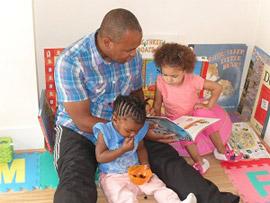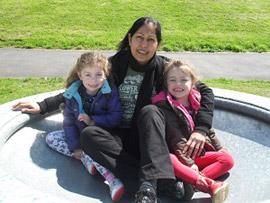Choosing a Childminder

- What is a childminder?
- How do I know my child will be safe?
- Why choose a childminder
- How to choose a childminder
- Search for childminders in Haringey (using the Family Information Service Directory - FISD)
What is a childminder?
A childminder is someone who is registered by Ofsted (the Office for Standards in Education) in their own home to care for unrelated children under the age of eight for more than two hours per day for reward.
Nationally, childminders currently make up the largest group of childcare providers.
Childminders are permitted to care for up to 6 children at any one time. They can care for 3 children under 5 (only one baby under 1 year old) and 3 children aged between 5 and 8.
Group childminders are where two or more people are registered together and can look after larger numbers of children. Some childminders also work with an assistant. More and more men are becoming childminders, either working with partners or alone. Some people are shocked to learn this, however, there are many benefits to children having a positive male role model.
Find out all about Haringey's childminders
Note for iPhone users and Youtube. There is a known bug with iOS and Youtube, Two buttons are read before the player but provide no functionality. We advise that you skip these to access the content.
How do I know my child will be safe?
All childminders and anyone in their household over 16 go through a thorough vetting procedure by Ofsted which includes checks with:
- The Disclosure and Barring Service (DBS)
- Social Services
- Ofsted - who will interview the prospective childminder to assess their suitability to look after children
Childminders have to show knowledge and understanding of the Early Years Foundation Stage Framework (EYFS) and demonstrate how they will put this document into practice before they can be registered.
Regular inspections are carried out by Ofsted and a childminder will receive a report following this inspection. New childminders attend an initial training course and must get a First Aid for Children and Babies qualification before being registered. They must also attend training on Safeguarding and Child protection, Food Hygiene, a minimum of a level 2 in Childcare and the Early Years Foundation Stage.
The Co-ordinator for Childminding Services and the Early Years team makes home visits and support the development of individual childminders. All childminders are encouraged to continue their professional development by training and attending regular development forum meetings.
Why choose a childminder?

Childminders can offer:
- Individual care, sometimes even one to one, where time can be spent interacting with your child - whether that's having a cuddle, singing nursery rhymes, learning through messy or creative play or helping with homework
- Flexible hours - usually earlier or later starts than day nurseries and Out-of-School-Clubs can offer. Some childminders can offer weekends and shift work patterns
- Home-based care
- Low adult to child ratios
- Continuity of care - from just a few weeks right through to secondary school
- To meet the individual needs of your baby/child, adapting where possible to the routines of your child
- Flexible support for children with additional needs
- Social outings to toddler groups and childminder drop-ins
- Real life learning, in a community environment, with regular trips to the local libraries, shops, parks and other facilities
- Care within a mixed age environment, with brothers and sisters cared for who are pre-school and school aged, in a family environment
How to choose a childminder
This can be a daunting task, so we've provided advice below.
We would recommend that you visit as many childminders as you can. This will allow you to compare the different services that each childminder has to offer and allow you to make a more informed choice.
Initial Contact
The first contact you will probably have with a childminder will be over the telephone. Remember, if you ring during childminding hours s/he may be busy interacting with the children and therefore unable to give you much time to explain his/her service in any detail. Avoid asking the question "How much do you charge?" over the telephone. Many childminders are reluctant to discuss money until you have had an opportunity to see their home and find out what they are able to offer you and your child.
The visit
On your first visit to any childminder it would be a good idea to have a list of questions prepared. It's easy on the first meeting to forget what you had wanted to know. Try and relax, often the childminder is also nervous as well as they too want to make a good first impression.
Take along your partner or a friend to the visits for added support. Remember to inform the childminder that you will be bringing someone so that s/he will know who to expect, remember you are visiting their home.
When visiting childminders, ask to see their documentation, records, policies and procedures. It is a legal requirement for a childminder to have a small number of written policies but good practice means they tend to have more than the minimum required (number of policies will vary). Spend time looking through and asking questions about these documents. It will give you a great insight into the quality of the childminder and the service that s/he is able to offer. It may also raise issues that you will need to discuss with her/him that you had never considered before.
Ask to have a look around the areas that the childminder intends to have available for childminding. You are not invading their privacy, this is their 'work setting' and where your child will be cared for. It is important that you are happy with the environment.
Ask lots of questions. This is your opportunity to find out exactly what your child will be doing whilst in their care. You will be able to establish if the childminder has the same sort of standards and principles that you have and whether you will be able to 'work' with him/her to care for your child. After all this will be a partnership and you do need to be able to communicate and get along.
Indicators of Quality
All childminders have to work with the Early Years Foundation Stage document just like all other early years settings. If the childminder has had an inspection ask to see a copy of their report. Read it fully - do not just read the grading and use that to make a decision. Some childminders may not have had an inspection. Do not worry - this just means that they are relatively new to childminding. All inspection reports can be downloaded and viewed from the Reports section of the Ofsted website (external link).
Once you have asked your questions and looked around the premises do not feel pressured into making a decision on the spot - hopefully you will have more childminders to visit. If you need time to think about your decision then say so. You must however let the childminder know your decision whatever it may be, as they might be holding the place for you. Remember you are entrusting your child to a stranger - make sure they are right for you and your child.
Finally, after all of the above, choose the childminder that you feel most comfortable with. If you have already developed a good relationship then you will be able to 'work' well together. Working in partnership with you chosen childminder, it is important that you are both open and approachable so that issues regarding your child can be dealt with promptly.
Find a childminder
To find a childminder in your area, you can use Childcare In Haringey - Haringey's online services directory for children.
